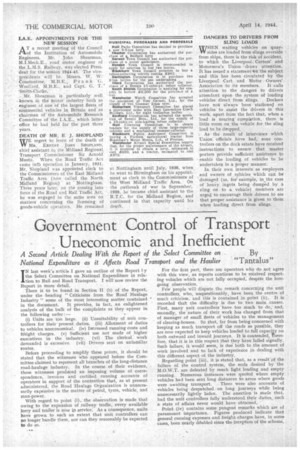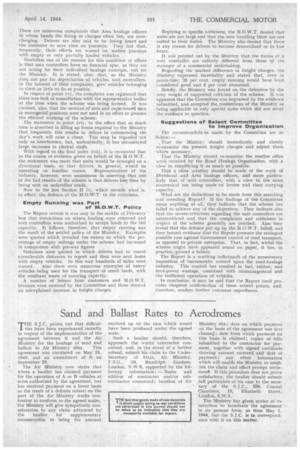Government Control of Transport Uneconomic and Inefficient
Page 20

Page 21

If you've noticed an error in this article please click here to report it so we can fix it.
A Second Article Dealing With the Report of the Select Committee on By National Expenditure as it Affects Road Transport and the Haulier "Tantalus" IN last week's article I gave an outline of the Report 1 y the Select Committee on National Expenditure in relation to Rail and Road Transport, I will-now review the Report in more detail.
There if to be found in Section II (b) of the Report, under the heading " Criticisms from the Road Haulage Industry" some of the most interesting matter contained in the document. It provides, in fact, an enlightened analysis of the butt of the Complaints as they appear in the following order :— .
(i) Units are too large. (ii) Unsuitability of unit controllers for their present duties. (iii) Allotment of duties to vehicles uneconomical. (iv) Increased running costs and freight charges. (v) Sufficient use not made of .higher executives in the industry. (vi) The clerical work demanded is excessive. (vii) Drivers sent an unfamiliar routes.
Before proceeding to amplify these points, it should be stated that the witnesses who appeared before the Committee claimed to represent all branches of the long-distance road-haulage industry. In the course of their evidence, these witnesses prochked an imposing volume of correspondence,. invoices and certified running accounts of operators in support of the contention that, as at present ad-ministered, the Road 'Haulage Organization is unnecessarily expensive in the matter of petrol, tyres, vehicle, and man-power. , With regard to point (i), the observation is made that owing to the expansion of railway traffic, every available lorry and trailer is now illi service. As a consequence, units have grown to such an extent that unit controllers can no longer handle them, nor can they reasonably be expected to do so. • • For the first part, there are operators who do not agree with this view, as reports continue to be received respecting vehicles which are not fully occupied, despite the foregoing observation.
Few people will dispute the remark concerning the unit " controllers, who, unquestionably, have been the centre of much criticism, and this is contained in point (ii). It is recorded that the difficulty is due to two main .causes. First, many unit controllers have too much to do,and; secondly, the nature of their work has changed from that of manager of small fleets of vehicles to the management of clearing-houses. So that, far from being concerned with keeping as much transport off the roads as possible, they are now expected to keep vehicles loaded to full capacily on both outward and inward journeys. It is contended, Therefore, that it is in this respect that they have failed signally. Such failure, it would seem, is due both to the amount of work involved and to lack of experience in dealing with this different aspect of the industry.
Regarding point (iii), it is stated that, as a resultof the failure of the control system, the ends desired by the M.O.W.T. are defeated by much light loading and empty running. Numerous instances were quoted where empty vehicles bad been sent long distances to areas where goods were awaiting transport. . There were also accounts of vehicles being despatched on long journeys while being • unnecessarily lightly laden. The assertion is made that, had the unit controllers fully understood their duties, such a state of affairs never would have obtained,
Point (iv) contains some pungent remarks which are of paramount importance. Figures produced indicate that general running expenses and freight charges have, in some cases, been nearly dbubled since the inception of the scheme.
There are numerous complaints that Area haulage officers in whose hands the fixing of charges often lies, are overcharging. Drivers are also said -to be losing heart awl the incentive to save time on journeys. They feel that, frequently, their efforts are wasted on useless journeys with empty or only. -partially loaded vehicles.
Doubtless one of the reasons for this condition of affairs is that unit Controllers have no financial spur, as they are not acting for their individual haulage conceens, but for the Ministry. It is stated, also, that, as the Ministry does not pay for depreciation of vehicles, unit controllers, in the interest of their Companies, give vehicles belonging to them as little to do as possible.
In respect of point (v), the complaint was registered that there-was lack of consultation with the representative bodies at the time when the scheme was being formed. It Was claimed, also, that the services of able and experienced Men in managerial positions were not psed in an effcirt to procure the efficient working of the scheme.
The statement in point (vi), to the effect that so Much time is absorbed in filling up forms required by the Ministry that frequently this results in delays in' commencing the day's work will raise a cheer. This may be regarded not only as interference, but, undoubtedly, it has necessitated large increases in clerical staffs, With regard to the final point (vii), it is recounted that in the course of evidence given on behalf of the M 0.W.T.. the statement was made that units would be arranged on a directional basis, so that drivers, in general', wouldbe operating on familiar routes. Representatives of the industry, however, were unanimous in asserting that one of the bad results of the scheme is that drivers lose, time by being sent on unfamiliar roads.
Now to the last Section II fc); which records what is. in effect, the defence of the M.O.W.T. to the criticisms.
Empty Running 'was. Part of M.O.W.T. Policy
The Report reveals it was only in the middle of February last that restrictions on return loading were removed and unit contraers vere authorized to accept loadS to the Dill capacity; It follows, therefore, that empty running was the result of the settled policy of the Ministry. Examples were .quoted which revealed the extent-to which the percentage of empty mileage under the scheme had increased in comparison with pre-war figures
Instances were quoted in which drivers had to travel considerable distances to report and then were sent home with empty vehicles. In this way hundreds of miles were
wasted. Also there were numerous examples of heavy vehicles being used for the transport. of small loads, with the resultant waste of carrying capacity.
A number of letters from customers and M.O.W.T. invoices were received by the Committee and these showed an unexplained increase in freight Charges.
Replying. to specific criticisms, the KO.W.T, denied that units are too large and that the men handling them are not suited to their dutie:S. The Ministry also denied that there is any reason for drivers to. become demoralized or to lose heart.
It wed pointed out by the Ministry that the duties of a unit controller are entirely different from those of the manager of a commercial undertaking. .
Regarding the marked difference izi freight charges, the Ministry expressed incredulity and stated that, even in peace-time, 25 per cent. empty running would have been considered good and 5 per cent abnormal.
Briefly, the Ministry was forced on the defensive by the very weight of supported criticism of the scheme. It was apparent that the Committee was impressed by the evidence . submitted, and accepted the, contentions of the Ministry as being applicable to only special cases which did not rebut the eviclenCe in question.
Suggestions of Select Committee to Improve Organization Th recommendatirns made by the Committee are as
,That the Ministry 'should immediately and closely re-examine the present freight .charges and adjust them wheee necessary.
That the Ministry should re-examine the routine office work entailed by the Road Haulage Organization, with a view to simplifying it as much as possible.
That a close scrutiny should be made of the work of Divisional . and Area haulage officers, and more particu
larly that of unit controllers, with a view to the more economical use being made of lorries and their carrying capacity.
What are the deductions to be made from this searching and revealing Report? If the findings Of the Committee mean anything at all, they indicate that the scheme has failed to achieve any of the objectives. They indicate also that the severe. criticisms regarding the unit controllers are
substantiated and that thern complaints and criticisms in • respect of the scheme generally are justified.. Also they reveal that the defence put up by the 11(1.0.W.T. failed, and
they furnish evidence that the Report presents the strongest possible case against Government control of road transport, as opposed to private enterprise. That, in fact, whilst the scheme might have appeared sound on paper, it has, in practice, proved a failure.
The Report is a scathing indictmetit of the unnecessary imposition of bureaucratic control Upon the road-haulage industry. This control has resulted in fuel, rubber, and man-power wastage, combined with mismanagement and the inefficient operation of vehieles.
In conclusion, it may be said that the Report itself provides eloquent confirmation of these salient points, arid, therefore, renders further comment superfluous.




















































